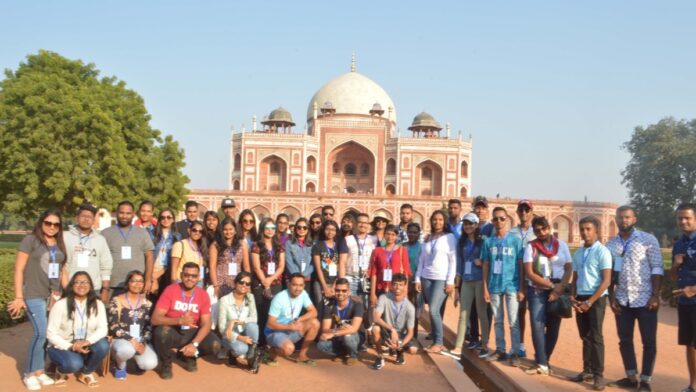Girmitiya, sometimes also referred to as jahajis, were the part of the Indian population that migrated under the Indian indentured labour category
The 74th edition of the Know India Programme (KIP) is now on. The recent engagement with 40 People of Indian Origin (PIO) youth, aged 21-35, representing various regions of the world at the Antar Rashtriya Sahyog Parishad (ARSP) recently, evoked reflections on the enduring saga of the struggles faced by ‘Girmitiya’ nations and their diasporas, reported oneindia.com.
Girmitiya, sometimes also referred to as jahajis, were the part of the Indian population that migrated under the Indian indentured labour category. Following the Abolition of Slavery, the British and French sought to address the labour shortage in their colonies by transporting Indians through the Indian indentured labour agreement in the 18th century. While numerous factors motivated some Indians to seek opportunities in distant lands, many fell victim to exploitation within this system after being deceived by contractors.
This is how Indians migrated and eventually settled in various countries such as Mauritius, Seychelles, Reunion, Trinidad and Tobago, initially labouring in sugarcane and coffee plantations. Migration surged after the abolition of slavery, with a total of 525,482 Indians emigrating to British and French colonies between 1842 and 1870. After the expiration of their indenture contracts, some of the labourers chose to return to India, while the majority opted to remain in their adopted countries.
Enduring significant discrimination and exploitation under colonial rule, many persevered to establish livelihoods and families in their new homes. Despite their struggles, their Indian identity remains a strong bond to their homeland.
Fluent in their regional languages such as Hindi, Gujarati, Tamil, Bengali, Malayalam, and Bhojpuri, they maintain close ties to Indian cultures and traditions. However, a significant gap existed: subsequent generations of PIOs had never had the chance to visit their ancestral homeland due to various reasons. Recognizing this, the Indian government sought to bridge this gap and connect with the younger Indian diaspora. In the early 2000s, as part of an expanded diaspora policy, the government launched several initiatives, including Pravasi Bharatiya Diwas and others.
An initiative like the Know India Programme (KIP) has earned immense praise and support from the global diaspora community, particularly from the older generation. Its significance lies in its ability to serve as a bridge between the younger generation of diaspora members and the advancements taking place in their ancestral homeland
Among these initiatives introduced in 2003 was the Know India Programme (KIP). The government’s focus on connecting with PIO youth can be seen in its willingness to host KIPs. The 74th KIP which is being held from February 11, 2024 to March 1, 2024 is the fourth KIP held in the year 2024. The government has organized a structured program for these 40 young PIOs, taking them to various parts of India. This itinerary includes visits to monuments, tourist attractions, cultural centers, government and private universities. The aim is to provide them with a comprehensive understanding of India’s socio-economic progress, cultural heritage, and recent developments.
The Program also encompasses exposure to various traditional practices like Yoga, Ayurveda, classical Indian music, and dance forms. AD Additionally, participants have the chance to visit pivotal institutions in democracy and governance, including the Parliament of India and the Rashtrapati Bhawan.
Further, attendees are acquainted with flagship economic and development endeavors such as Digital India, StartUp India, and Make in India.
An initiative like the Know India Programme (KIP) has earned immense praise and support from the global diaspora community, particularly from the older generation. Its significance lies in its ability to serve as a bridge between the younger generation of diaspora members and the advancements taking place in their ancestral homeland. Through KIP, these young individuals gain valuable insights into the ongoing developments in India, ranging from socio-economic progress to cultural rejuvenation. By providing them with firsthand experiences and exposure to various facets of Indian life, KIP empowers these youths to shape their perceptions and understanding of their country of origin. Moreover, the program fosters a deep sense of emotional and cultural attachment among participants, strengthening their bonds with India and fostering a sense of belonging despite living in distant lands.
***********************************************************************
Readers



